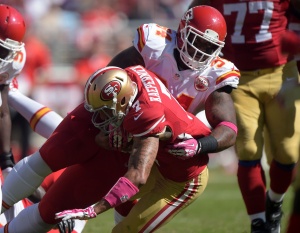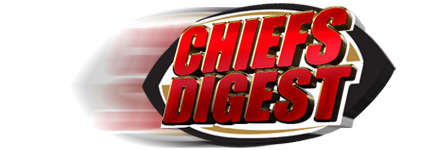
Oct 5, 2014; Santa Clara, CA; Chiefs defensive lineman Kevin Vickerson (94) tackles San Francisco 49ers quarterback Colin Kaepernick (7) at Levi’s Stadium. Credit: Kirby Lee-USA TODAY Sports
KANSAS CITY, Mo. – Fans sitting within close proximity to a football field have to listen closely if they want to hear the on-field banter over the roaring crowd.
But even if fans don’t hear it, rest assured trash talking occurs between players before, during and after a play.
Some of the talk is taken in good humor.
“There’s obviously trash talking going on,” said Chiefs long snapper Thomas Gafford, who hears the chatter in the trenches. “But it’s more funny than anything. It’s never threatening or anything like that.”
As for the other banter?
Well, let’s just say it may not be suitable for the easily offended.
“I can’t tell you,” Chiefs defensive lineman Kevin Vickerson said with a laugh. “It’s not clean.”
Chiefs tight end Travis Kelce agreed.
“I’d rather not express that,” Kelce said with a grin. “I’ll just leave it at that. It gets pretty explicit out there.”
Trash talking among opponents has been a part of the game for decades.
And some of the NFL’s greatest players, such as Hall of Fame linebacker Lawrence Taylor or Hall of Fame tight end Shannon Sharpe, weren’t shy during their respective careers to let an opponent know how they felt.
But while trash talking exists today, the art of noise may not be as prevalent compared to just a short 10 years ago.
Vickerson, a nine-year pro, said he’s noticed the banter on the field has dwindled in recent years since he first entered the league in 2005.
The decrease in activity likely has to do with the NFL attempting to clean its image, which includes a point of emphasis on enforcing taunting penalties in 2014.
“There weren’t any rules,” Vickerson said of trash talking during his early playing days. “You could say whatever you wanted to say. It was no holds barred then. I think now the league is trying to regulate what guys can say and what things you can say. It still goes on, but it’s just not as much as before.”
Gafford, who is in his seventh season, also notices a difference from when he entered the league in 2006.
“I think the game is maturing a little bit,” Gafford said. “The players are maturing a little bit, and that’s part of it. Everybody is trying to beat the guy in front of them. You don’t have to talk about it.”
Still, the Chiefs may hear plenty Sunday against the Seattle Seahawks, as one of the league’s current best trash talkers takes the field.
And Seahawks cornerback Richard Sherman brings the playing credentials to chat it up if he desires considering he is arguably the top cover corner in the game.
Sherman is so good at letting his opponents have it that ESPN aired a one-on-one interview segment with the two-time All-Pro in Week 5 of the 2013 season to discuss trash talking.
Sherman, who has 21 interceptions on his four-year career, clearly has the physical skills. But he said during Wednesday’s conference call with Chiefs beat writers he doesn’t necessarily use trash talking as a weapon against an opponent.
“It’s one of those things that happen within the flow of the game sometimes and other times it doesn’t,” Sherman said. “It’s not something you consciously do or you consciously say I’m going to go after this guy. It’s just one of those flow of the game type things.”
Chiefs wide receiver Frankie Hammond Jr., who is in line to start against Seattle in place of Donnie Avery (groin, out) and A.J. Jenkins (shoulder, out), is aware of the chatter that could come his way from the defensive side of the ball.
But the second-year pro takes it in stride.
“Football is football,” Hammond said. “They’re not the first team to talk and they definitely won’t be the last. You have to let it go in one ear and out the other, and go back to the huddle and just play football.”
Meanwhile, there are unwritten protocols when deciding to engage in trash talking.
“Unless you’re really in a dogfight, you can’t really be trash talking if it’s a one-sided game,” Kelce said. “That’s the only thing, especially if you’re on the lower end of things.”
Kelce brings up a good point because mental lapses result in mistakes, which will cost a team with poor individual play or unnecessary penalties.
The player dishing out the trash talk wins and he immediately knows he’s in the opponent’s head.
“If I’m talking to him and he jumps offside or he gets a personal foul,” Vickerson said, “he does something to hurt his team, then I know I got you.”
An opportunity for that scenario presented itself in Week 10 against the Buffalo Bills.
Buffalo’s offense lined up early in the fourth quarter on fourth-and-1 at its own 46-yard line to potentially go for the first down. But right tackle Seantrel Henderson gave a subtle flinch that Vickerson immediately noticed, prompting the defensive end to fire across the line of scrimmage and point to Henderson.
The Bills were penalized 5 yards for a false start and effectively ended an opportunity at gaining the necessary yard for a first down if the ball was snapped before the penalty.
Vickerson admitted he let Henderson know about the penalty after the play.
“I said something,” Vickerson said with a chuckle, “but I can’t repeat it.”
For the most part, there is no malice when trash talking occurs between players. Moreover, it’s not often meant to be personal and shouldn’t be taken personally.
“At the end of the day, it’s all fun competition,” Kelce said. “I don’t take anything to heart. Never have, never will.”
His defensive teammate agreed.
“For me, it’s just fun,” Vickerson said. “Talking junk, like old school backyard ball. That’s really what it is.”
As for the best way to do the talking, Kelce, who ranks first among NFL tight ends in yards after catch (YAC) with 8.4, leans to actions speaking louder than words.
“You might hear me say a few things here and there,” Kelce said. “But for the most part I let my play do the talking.”
